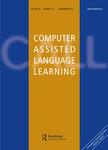版权所有:内蒙古大学图书馆 技术提供:维普资讯• 智图
内蒙古自治区呼和浩特市赛罕区大学西街235号 邮编: 010021

作者机构:Indiana Univ Penn Dept English 1011 South Dr Indiana PA 15701 USA UC Santa Barbara English Multilingual Students Santa Barbara CA USA Univ Guam Sch Educ Mangilao GU 96923 USA
出 版 物:《COMPUTER ASSISTED LANGUAGE LEARNING》 (计算机辅助语言学习)
年 卷 期:2020年第33卷第3期
页 面:240-274页
核心收录:
学科分类:0502[文学-外国语言文学] 0401[教育学-教育学] 05[文学]
基 金:Animal Health Board(R-80575) National Institute of Water and Atmospheric Research
主 题:Flipped classroom learner attitudes technology-enhanced language learning computer-assisted language learning
摘 要:This study investigates self-reported attitudes about technology-enhanced language learning in the flipped classroom across borders in three tertiary-level contexts. As a method to address students needs for twenty-first century education, the flipped classroom pedagogical approach was chosen to explore student attitudes towards technology for language learning in credit-bearing language courses in USA and Macau and non-credit-bearing courses in Colombia. This study implemented an experimental design with a mixed methods approach for data collection. Data was collected from a technology survey, focus group sessions, and reflective essays. Before each class, students in the experimental groups in all three countries previewed lessons and engaged in activities through online videos and screencasts in order to better prepare for in class activities. Results showed that the USA experimental group showed a statistically significant difference in all self-reported attitudes in using technology for language learning overtime. Between groups statistical analyses found flipped classrooms experienced a statistically significant different change in self-reported attitudes on instrumentality, digital literacy, and anxiety. Overall, students in the USA and Columbian contexts may have less anxiety about using technology for language learning in a flipped classroom, and the flipped classroom may positively impact students attitudes towards technology in Columbia, Macau, and USA.